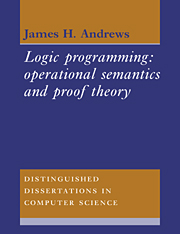2 - Operational Semantics
Published online by Cambridge University Press: 23 November 2009
Summary
Operational (or “procedural”) semantics, as I mentioned in the Introduction, are used to provide characterisations of programming languages which meet certain “computational” criteria: giving a detailed description of the language for implementation purposes, and giving a computational model to which programmers can refer.
For logic programming, operational semantics are particularly important because it is in them that the innovations of logic programming lie. The notions of resolution and unification are not immediately apparent; unification, though defined by Herbrand in his thesis [44], was virtually ignored until Prawitz's work [62], and resolution was not defined until 1965 [66]. These notions must be explained within the context of a full description of the computational model of the language.
If we want to do such things as soundness and completeness proofs, or indeed any formal comparison of the operational semantics to other characterisations of the language, the operational semantics must also be mathematically precise – for instance, in the form of a formal system. (Plotkin [58] has explored the idea of structured operational semantics in detail, and gives a taxonomy to which I will refer in this chapter.) SLD-resolution [49], SLDNF-resolution [50], and the operational semantics in this chapter are just a few examples of formal operational semantics for logic programming. Other examples include Voda's tree-rewriting system [76], Deransart and Ferrand's [29] and Börger's [13] standardisation efforts, and the abstract computation engines for Andorra Prolog [43] and the “Pure Logic Language”, PLL [10, 52].
- Type
- Chapter
- Information
- Logic ProgrammingOperational Semantics and Proof Theory, pp. 9 - 30Publisher: Cambridge University PressPrint publication year: 1992
- 1
- Cited by



